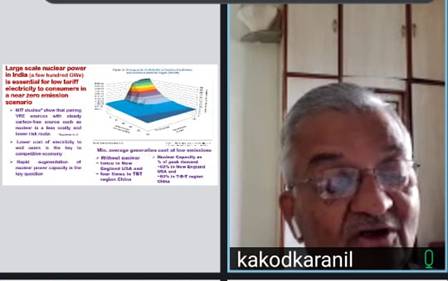Ministry of Science & Technology
Former Chairman, Atomic Energy Commission, harps on Disruptive Technologies for Competitive Cost of Energy & De-carbonisation
प्रविष्टि तिथि:
25 AUG 2021 3:55PM by PIB Delhi
Dr. Anil Kakodkar, former chairman, Atomic Energy Commission, stressed that lower cost of energy is key to the growth of the economy, and India should focus on developing disruptive technologies to keep the cost competitive and meet the goal of decarbonisation by year 2050, at a talk today.
“Clean energy supply would increase 120 to 140 times, and this increase has to come primarily through solar, wind, and nuclear. Share of electricity would go up primarily for e-mobility. Surplus biomass can be converted to hydrogen or hydrogen substitutes for use in industry and transportation. Carbon Capture and Utilisation (CCU) is inevitable for transition to low carbon economy, Dr. Kakodkar, who is also the former chairman, Technology Information, Forecasting & Assessment Council (TIFAC), said at the online talk organized as part of the TIFAC Tech talk series.
“We need to learn strategies for rapid deployment of pressurized heavy water reactors which are indigenous, very competitive, and high performance, as well as strategies for deployment of light water reactors and for cogeneration of hydrogen. Thrust areas for further strategies for decarbonisation include hydrogen and electric mobility, conversion of surplus agricultural residue, solar, wind, and nuclear energy to hydrogen or hydrocarbons, non-fossil heating, and refrigeration and conversion of coal to fluid fuel to minimise energy import bill. They also include CCU to minimise emission and enhancement of domestic petrochemicals production to meet demand and improve the balance of payment as well as energy security,” he said.
“Critical technologies to enable circular economy around hydrocarbon fuels and life cycle management of energy systems include steam electrolysis, thermochemical splitting of water, solar thermal, energy storage technologies, production of hydro-carbon substitutes using hydrogen and bio-mass and CCU technologies. While there is significant scope for an increase in CCU, circular economy around carbon/hydrocarbon use would only address the challenge of net-zero emissions. We need new problem definitions, out-of-box thinking, disruptive technologies,” Dr. Kakodkar further added.
The talk series on the topic “Energy Security and Sustainability in India” has been organized by TIFAC, an autonomous organization of DST, to disseminate knowledge of Science & Technology for the benefit of the scientific fraternity and society on the occasion of the celebration of the Azadi Ka Amrit Mahotsav.
Dr. Pradeep Srivastava, Executive Director, TIFAC, highlighted energy challenges and future roadmap. “The buzzword for today’s world and the economy is energy. We know the trends, and there are opportunities and challenges for India. India is celebrating Azadi Ka Amrit Mahotsav. We have achieved a lot in the past, and keeping in mind the future challenges for India, we need to get future directions to be on the right path to achieve our goals. Energy is integral to the support of our economy, and it should be clean, affordable, and sustainable. This talk would help us understand India’s energy roadmap for sustainability and security in the energy sector,” he pointed out.

*****
SNC / PK / RR
(रिलीज़ आईडी: 1748885)
आगंतुक पटल : 1176